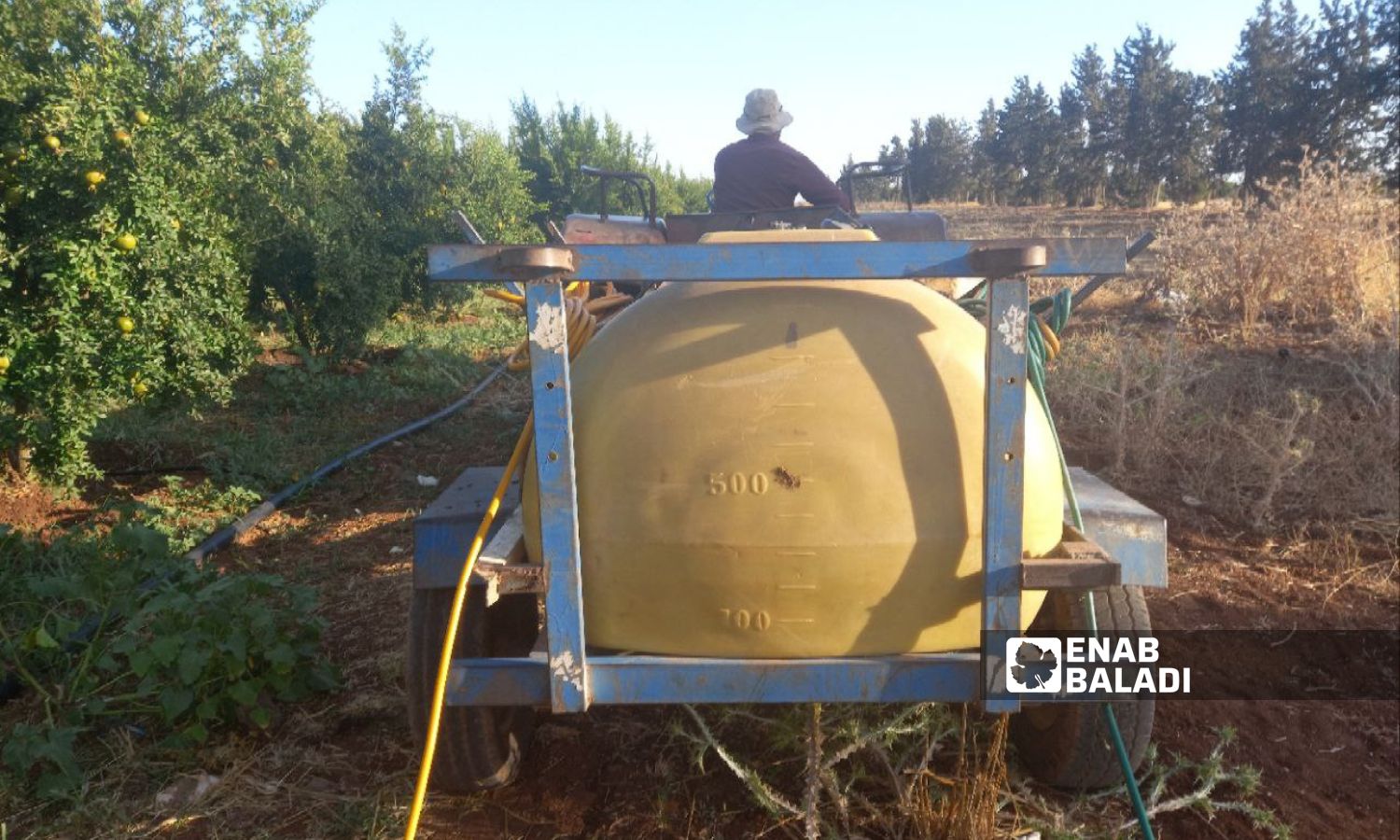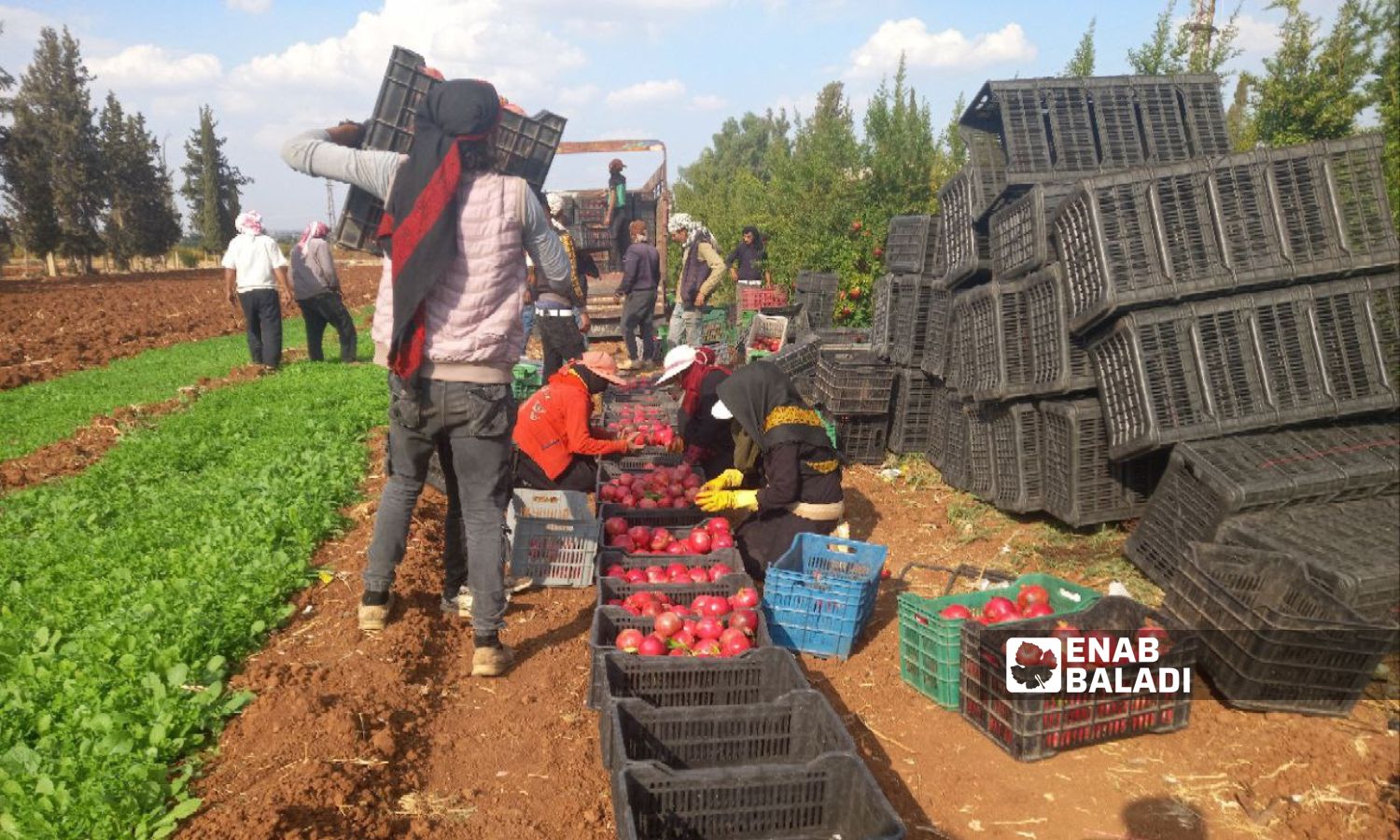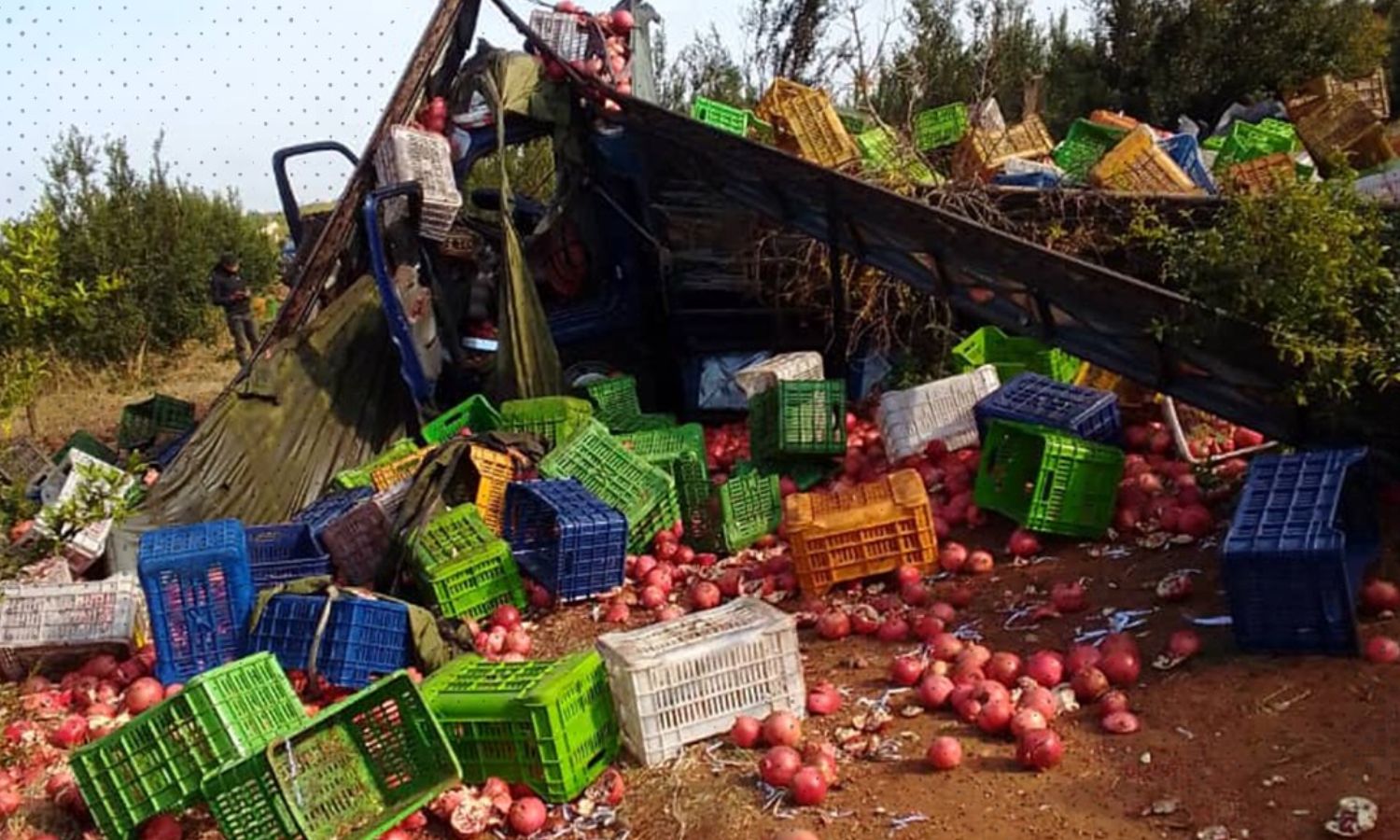



Although five years have passed since the end of military operations in the southern Daraa governorate, the danger of mines is still a source of concern for the residents, including farmers who have suffered losses in their agricultural machinery due to mines and some of whom have been killed as a result of their injuries, without concrete efforts to remove them from the area.
In early November, a landmine exploded in an agricultural vehicle south of the town of Tafas, west of Daraa city, while harvesting pomegranate crops, resulting in material damage to the owner of the agricultural vehicle, whose price is estimated at about 200 million Syrian pounds (about $14,000).
One day earlier, a landmine exploded targeting an agricultural vehicle (truck) while working to clean agricultural land in the town of Karak, east of Daraa, which resulted in its destruction without human casualties, according to Enab Baladi’s correspondent.
Incidents of mine explosions have been repeated during the past five years after the regime took control of the Daraa and Quneitra governorates in July 2018, and the Syrian regime forces did not comb the areas contaminated with mines, according to testimonies from residents surveyed by Enab Baladi.
According to a report issued by the Euro-Mediterranean Center for Human Rights, Syria was severely contaminated with landmines “as a result of the war that began in 2011,” in which 2,637 civilians were killed, including 605 children and 277 women, as a result of mine explosions between March 2011 and March 2020.
Mohammad Kiwan rented agricultural land in the vicinity of the town of Jalin, west of Daraa, where the Islamic State group was stationed years ago, which spread mines throughout it, according to what he told Enab Baladi.
Kiwan, 40, added that he is still afraid of the explosion of mines, especially during the plowing phase or loading crops with agricultural vehicles when the vehicles enter the agricultural field.
The owner of the same land hired engineering units belonging to the Fourth Division of the regime forces years ago to sweep his 15-dunam land in exchange for a financial reward, according to Kiwan, but he is still afraid of the explosion of mines while he is working on it.
The farmer told Enab Baladi that the suffering began in 2018 when those working on plowing tractors and harvesters began refusing to work in the areas that were lines of contact between the military authorities for fear of the explosion of mines while they were working there.

Workers harvesting the pomegranate crop prepared for storage, west of Daraa city – November 1, 2023 (Enab Baladi/Halim Muhammad)
Abu al-Fidaa al-Sukari, one of the notables of the eastern countryside and a resident of the town of Karak, told Enab Baladi that since the regime took control of southern Syria in July 2018, no party has been active in clearing mines, and no combing operation has been conducted in the area, whether by engineering units affiliated with the regime army or from specialized international organizations.
According to al-Sukari, combating these effects of battles was limited to monitoring them by the local population, but their danger remains buried under a layer of dirt as long as neither the civilian nor the farmer is able to detect it.
A leader in a local faction in Tafas town, west of Daraa, who declined to reveal his name for security reasons, told Enab Baladi that dealing with mines was not organized through competent authorities. Rather, some local factions work to detonate detected mines if farmers or shepherds discover them, while the danger remains constant in hidden mines.
A defected soldier from the regime forces residing in the western countryside of Daraa told Enab Baladi that the danger lies in the fact that the mines were planted randomly, that is, without maps specifying their locations so that they could be removed later.
Many parties were involved in planting mines in the region, including the Syrian regime, the Islamic State group, and the Syrian opposition factions that controlled the region before 2018.
No efforts were organized by the engineering units to dismantle the mines, as handling and detection require expertise and equipment that is not available to the population, according to al-Sukari.
The defected soldier, who previously worked as a fighter in the local opposition factions in the region, added that the threat of mines will continue unless there is organized combing of the areas that witnessed battles over the past years.
He distinguished the mines into three types, the first of which is individual mines designated for infantry personnel and vehicles whose weight exceeds 15 kilograms and causes permanent disability that results in the amputation of limbs in most cases.
The second type is a mine designated for heavy machinery, or what is known militarily as a “tank mine.” This type requires heavy weights in order to explode. The military personnel added that this type of mine resulted in the explosion of tractors and agricultural vehicles, causing injuries to individuals that are considered more dangerous than the previous ones.
In addition to the previous two types, remnants of unexploded cluster bombs left behind by the regime and Russia’s bombing of southern Syria before they took control of the region are widespread in the region. This type represents a danger, especially to children.

A landmine exploded in an agricultural vehicle during the pomegranate harvest season west of Daraa – November 1, 2023 (Horan Free League)
The local leader in Tafas attributed the recent explosion of two agricultural machines in the western countryside of Daraa to mines recently planted during the battles that took place south of Tafas last August between regime forces and local factions that were accused of covering up people wanted on charges of belonging to the Islamic State group.
He added that Daraa governorate was not stable after the regime took control of it with Russian-Iranian support and witnessed side battles between the factions, regime forces, and the IS group, as happened in the city of Jassim in October 2022, and Daraa al-Balad in November of the same year.
The regime attempted to storm the towns of Tafas, Jassim, and Daraa al-Balad, creating a state of instability and planting new mines around these cities.
The danger of mines was not limited to agricultural areas but included cities and schools, as the region had previously recorded cases of mine explosions or shells from bombing remnants, which injured a number of children.
On November 1, the young man, Walid al-Masalmeh, was seriously injured as a result of a mine explosion near the suburb area west of Daraa city center.
The most prominent incident was the killing of four children in a mine explosion in the western neighborhood of the town of Nasib in December 2019.
In November 2022, a child was killed, and five others were injured when a war remnant object that children were playing with exploded in the al-Manshiya neighborhood in the city of Daraa al-Balad.
Residents, especially in areas that were previously front lines, fear the presence of mines, as some of them refuse to work there, while farmers are forced to work on their agricultural lands despite the dangers of the presence of mines that the Syrian regime government did not deal with seriously.
if you think the article contain wrong information or you have additional details Send Correction